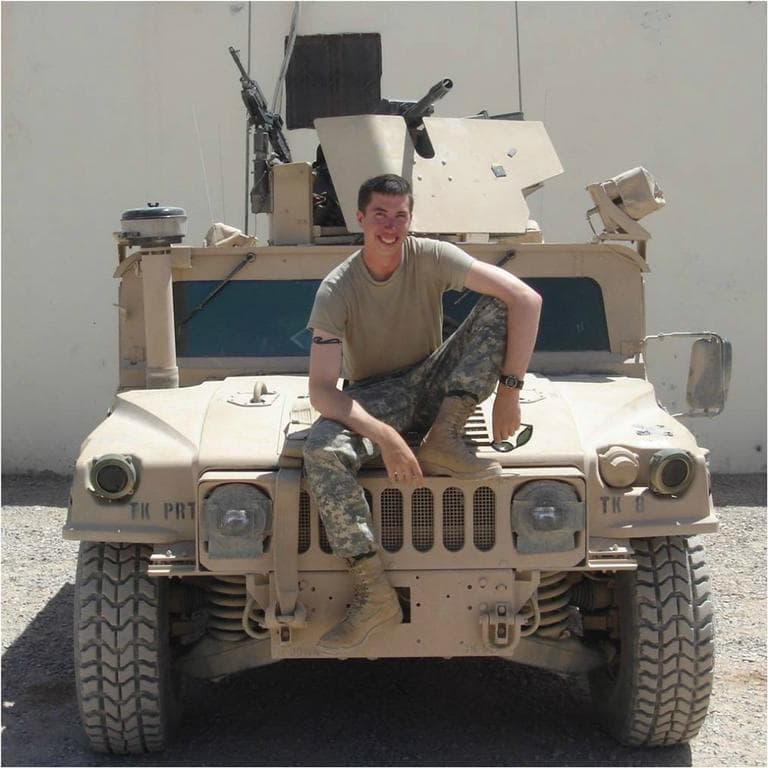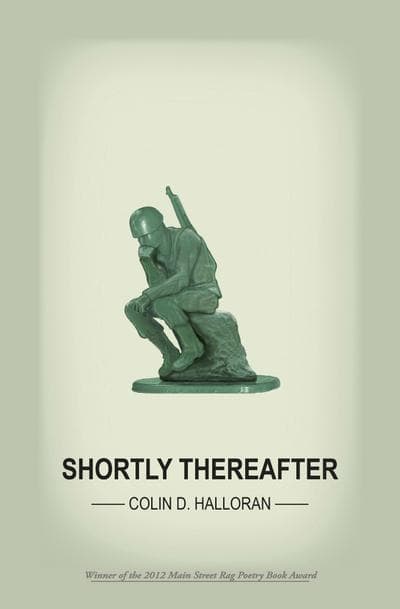Advertisement
'Shortly Thereafter': Reflections Of An Afghanistan Vet
Resume
When the presidential candidates talk about Afghanistan, they talk about getting out. That disturbs Colin Halloran, a young Afghanistan veteran from New England who's written a new poetry collection and memoir about the war, "Shortly Thereafter."
'Baptism By Fire'
Halloran's poem, "Spring Offensive" is based on one particular experience during his second or third week in Afghanistan, when he was just 20 years old. His convoy was hit with a vehicle born improvised explosive device (IED). Halloran read an excerpt from the poem:
"Basically someone packed a bunch of Soviet mortars into a pick up truck and drove it into the middle of our convoy and detonated himself and the mortars," Halloran explained. "I was leading the convoy; I was in the front vehicle. The vehicle two [vehicles] behind me was hit. My closest friend in the military took shrapnel and severe burns all down one side of his face."
But there was also a civilian casualty.
"Unfortunately there was also a small boy who had run out to greet the convoy as many children in Afghanistan do to try and get food or pens or water," Halloran recalled.
The Call To Duty

"The whole military thing was kind of surprise to everybody who knew me — and a little bit of a surprise to myself too," Halloran said. "Part of it was money for school. Part of it was this desire that I used to have to be in politics, wanting to actually have that as part of my record and actually have inside knowledge about things that I would potentially be making decisions about."
Despite all the practical reasons for joining, Halloran felt a deeper — albeit contradictory — calling.
"Part of it was this strange, kind of surprising call to duty that I felt, which I certainly wasn't expecting to feel as someone wearing Birkenstocks year round, hair down past my shoulders, carried an acoustic guitar everywhere, went to war protests."
Halloran arrived in Afghanistan in April 2006, just in time for the spring offensive — the namesake of his poem. His first reaction upon setting foot there was not one of wartime, though.
"It was beautiful. Nothing at all like I had seen on TV or in newspapers," Halloran said. "I was grateful that I could stop and appreciate the beauty of the country."
Enduring Chaos
Even though Halloran's poems have a quiet cadence to them, they were borne out of the roaring chaos of being a soldier.
Halloran has been diagnosed with post-traumatic stress disorder (PTSD) and has been improving with treatment.
"It's certainly been getting better," Halloran said. "It is very treatable. And writing certainly helps with that."
His poem, "It's 3 a.m.," captures his experience:
"I think one of the things that makes poetry what it is and makes it such a great form is that it boils things down to the essence," he said. "To approach war as a human experience and to really access what it does to an individual — not to a country or an economy or policies. To focus on it from an individual standpoint — for me, it just had to be poetry."
On War And Politics
"When you're over there, it has nothing to do with policies. It has nothing to do with abstractions like freedom or democracy," Halloran explained. "You're not fighting to protect your family; your family is thousands of miles away drinking cappuccinos and having a grand ol' time. It's frustrating to me to look at the bigger picture with war and the politics that go along with it. I want everybody home safe. At the same time, I want to feel like what I did there had a purpose — but I couldn't tell you what that purpose is."
This Saturday, Halloran will be part of the Boston Book Festival panel, Writing The War.
Guest:
- Colin D. Halloran, author of "Shortly Thereafter"
This segment aired on October 25, 2012.